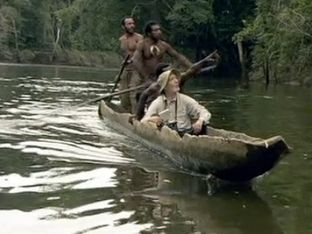PBS Specials
Guns, Germs and Steel: Out of Eden (2005x12)
Ausstrahlung: Nov 07, 2005
Jared Diamond’s journey of discovery began on the island of Papua New Guinea. There, in 1974, a local named Yali asked Diamond a deceptively simple question:
“Why is it that you white people developed so much cargo, but we black people had little cargo of our own?”
Diamond realized that Yali’s question penetrated the heart of a great mystery of human history -- the roots of global inequality.
Why were Europeans the ones with all the cargo? Why had they taken over so much of the world, instead of the native people of New Guinea? How did Europeans end up with what Diamond terms the agents of conquest: guns, germs and steel? It was these agents of conquest that allowed 168 Spanish conquistadors to defeat an Imperial Inca army of 80,000 in 1532, and set a pattern of European conquest which would continue right up to the present day.
Diamond knew that the answer had little to do with ingenuity or individual skill. From his own experience in the jungles of New Guinea, he had observed that native hunter-gatherers were just as intelligent as people of European descent -- and far more resourceful. Their lives were tough, and it seemed a terrible paradox of history that these extraordinary people should be the conquered, and not the conquerors.
To examine the reasons for European success, Jared realized he had to peel back the layers of history and begin his search at a time of equality – a time when all the peoples of the world lived in exactly the same way.
Time of Equality
At the end of the last Ice Age, around thirteen thousand years ago, people on all continents followed a so-called Stone Age way of life – they survived by hunting and gathering the available wild animals and plants. When resources were plentiful, this was a productive way of life.
But in times of scarcity, hunting and gathering was a precarious mode of survival. Populations remained relatively small, and the simple task of finding food occupied every waking momen
- Premiere: Feb 1964
- Episoden: 476
- Anhänger: 15
